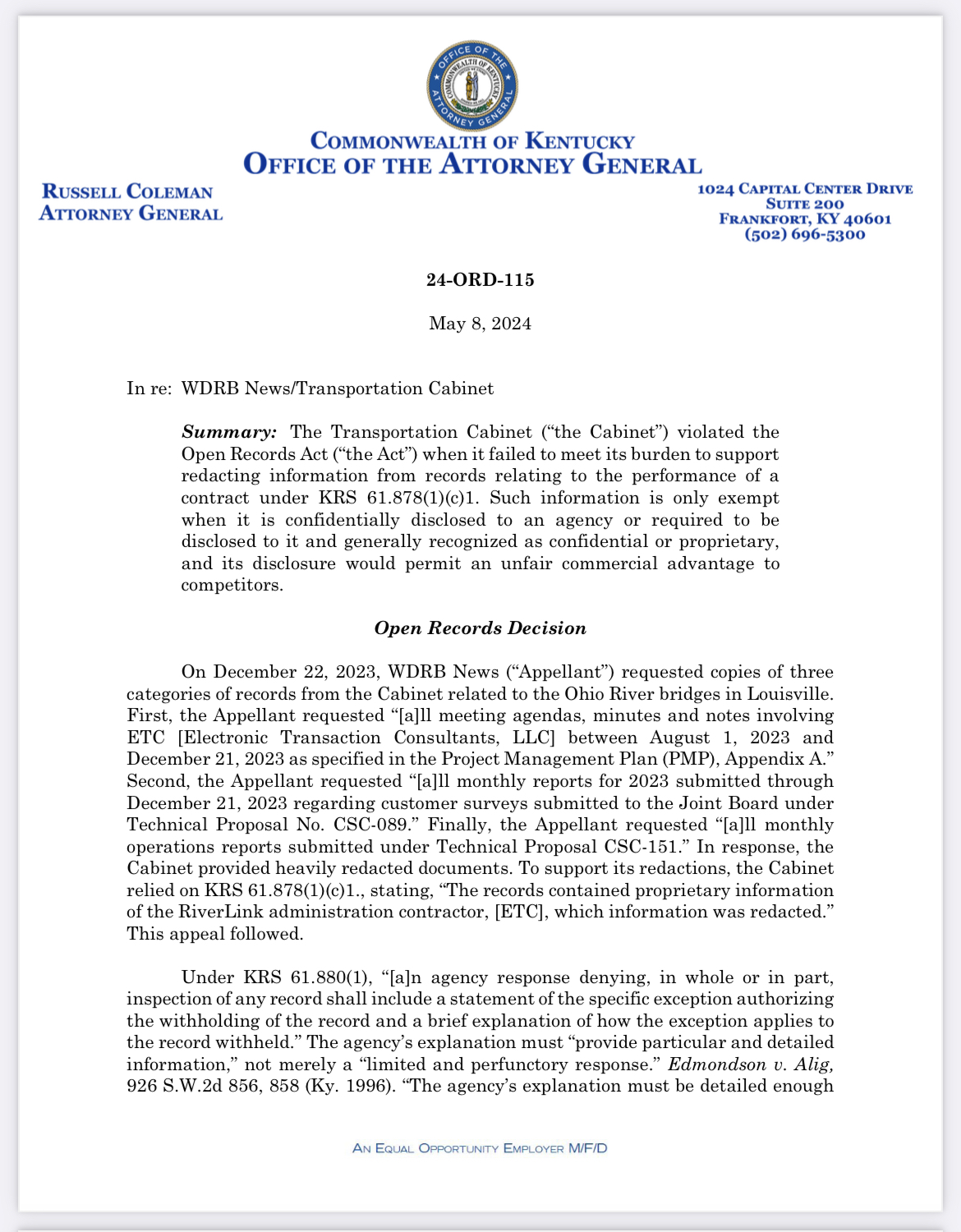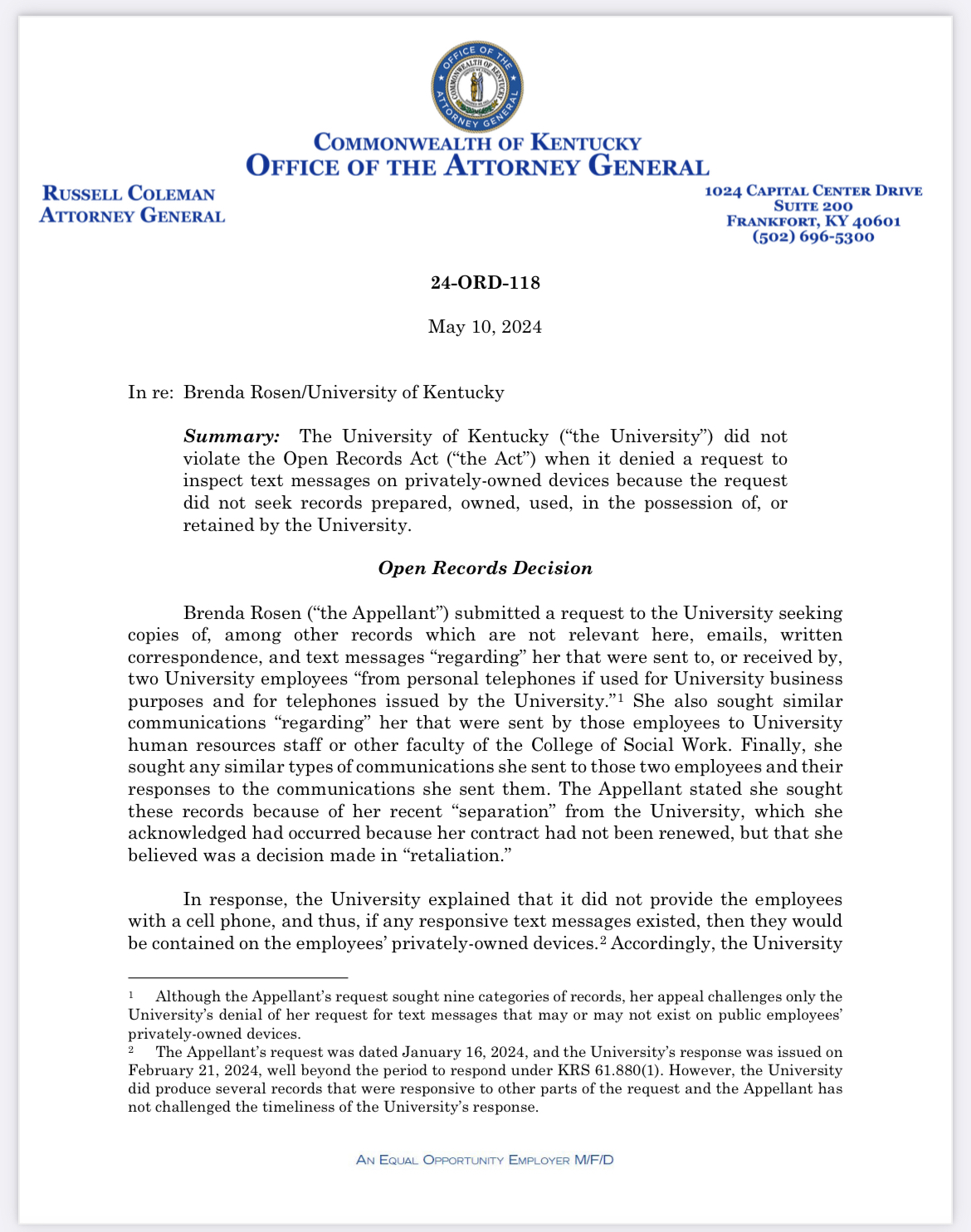

The best and the worst of Attorney General open records analysis were on display in open records decisions issued last week.
On May 8, the AG ruled that the Transportation Cabinet violated the open records law by heavily redacting weekly reports generated by the company that operates the Ohio River toll system. Rejecting the cabinet's reliance on the exception to the open records that permits nondisclosure of "records generally recognized as confidential or proprietary" that were "confidentially disclosed" to the cabinet, if disclosure "would permit an unfair commercial advantage to competitors"of the private entity that disclosed it, KRS 61.878(1)(c)1., the Attorney General issued an air-tight legal analysis in favor of WDRB's Marcus Green -- supported by decades of Attorney General open records decisions and caselaw -- that the cabinet did not prove the exception applies to the redacted information.
https://www.ag.ky.gov/Resources/orom/2024-OROM/2024/24-ORD-115.pdf
https://www.wdrb.com/in-depth/heavily-redacted-riverlink-reports-violat…
Noting that a predecessor to the RiverLink bridge contract "provided, without redaction, the same staffing and performance information the Cabinet and ETC have redacted here," the Attorney General concluded:
"Although the Cabinet claims the disclosure of information regarding ETC’s staffing allocation, performance statistics, and performance problems in administering the RiverLink contract could allow ETC’s competitors to obtain a 'commercial advantage,' it has not shown how any such advantage would be unfair. The public is entitled to know the details of how efficiently, or inefficiently, ETC has administered a public contract. If such information reveals ETC has not adequately performed the tasks it agreed to perform, it would not be 'unfair' for ETC’s competitors to learn that information and use it to their advantage in competing for similar contracts."
Echoing the Attorney Generals's assessment, WDRB's news director Jennifer Keeney commented, 24-ORD-115 "is a win for transparency. The public deserves to know exactly how efficiently the toll bridges are being operated."
24-ORD-115 is a balanced, well-reasoned, and legally unassailable decision that reaffirms the value of public oversight.
Compare this to 24-ORD-118 issued on May 10. There, the Attorney General ruled that the University of Kentucky did not violate the open records law when it denied a former university employee's request for text messages relating to her on public employees’ privately-owned devices "because the request did not seek records prepared, owned, used, in the possession of, or retained by the University."
https://www.ag.ky.gov/Resources/orom/2024-OROM/2024/24-ORD-118.pdf
Dismissing decades of authority -- including Attorney General open records decisions arising in various factual contexts, secondary legal sources, and the nonfinal October, 2024 Court of Appeals's opinion in Kentucky Open Government Coalition v Kentucky Department of Fish and Wildlife Resources Commission -- the Attorney General affirmed UK's facile argument that "it could not search for responsive text messages on the employees’ privately-owned devices."
https://caselaw.findlaw.com/court/ky-court-of-appeals/115372886.html
24-ORD-118 is a decision based on squishy legal analysis. It proceeds from the 2021 open records decision upending decades of legal interpretation and is devoid of open records authority pre-dating the Daniel Cameron administration.
https://www.ag.ky.gov/Resources/orom/2021/21-ORD-127.pdf
The Attorney General goes to extraordinary lengths to heighten fears -- and lend credence to unsubstantiated claims advanced in the 2024 legislative session -- that public employees may be required to surrender personal cellphones to fulfill an open records request. What began in 2021 as a nonsensical argument equating public records with agency property rights has evolved in 2024 into a wholesale attack on foundational tenets of the open records law. What constitutes public business? To whom does the law apply? What is the appropriate balance in weighing public and private interests.
Was this the playbook for the assault on open government in 2024? Will it return -- in a potentially expanded form - in 2025?
It seems increasingly likely that the impetus behind the false legislative rhetoric that passed for public policy in the debate surrounding 2024's House Bill 509 came from the opponents of open government -- first employed by Attorney General Cameron -- now employed by Attorney General Russell Coleman. These unapologetic defenders of government secrecy found a receptive audience -- and an instrument for their anti-transparency agenda -- in lawmakers willing to advance that agenda through draconian amendments to Kentucky's tested and true open records law.
https://apps.legislature.ky.gov/record/24rs/hb509.html
For those who followed the debate in the 2024 session, the familiar rhetoric is no coincidence. At page 7 of 24-ORD-118, the Attorney General writes:
"In the digital age that has developed since the Act was enacted in 1976, there is increasing tension between the public’s right to know what its government is doing and public employees’ right to privacy as private citizens. The Act cannot become a vehicle for the public to engage in general fishing expeditions through public employees’ personal communications. Until this tension is resolved, the only practical recourse is for public officials and employees to refrain from using private communication channels to conduct official business. But as the Act is currently written, communications in which a public agency has no property interest are not public records subject to inspection."
https://www.ag.ky.gov/Resources/orom/2024-OROM/2024/24-ORD-118.pdf
The Act as "currently written" resolves the grossly exaggerated "tension" between public employee privacy rights and the public's right to know by means of established statutory procedures and protections. The rest is pure fiction.
No one who understands the letter of the open records law, and the spirit that informs it, has any doubt. The only doubters are those with an avowed animus to open government and those, like University of Kentucky administrators, who will happily exploit any opportunity to evade public oversight. Their unsubstantiated, false, and cynical claims that records custodians are coming for public employees' personal cellphones is fear mongering in its basest form.
And make no mistake: They will not rest. Accordingly, the public cannot afford to rest.
The good, the bad, and the legally unconscionable -- a week in the life of the open records law as interpreted by the Kentucky Attorney General and a forecast of the false narrative lawmakers are likely to advance in defense of the destructive open records measures they may be plotting now.



